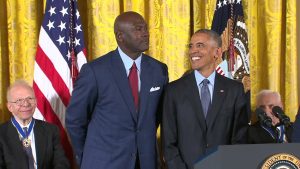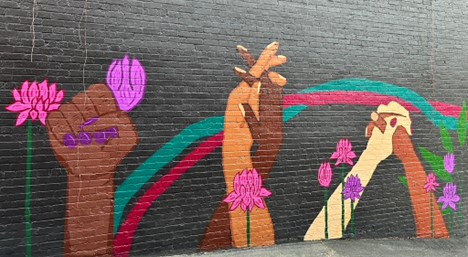The Jordan Institute for Families was launched in 1996 by Michael Jordan and the Jordan family in honor of their mother, Mrs. Delores Jordan. Mrs. Jordan not only raised 5 very successful children, she has been and remains a very committed change agent – driving towards impact and using her influence and talent to help families across the globe. Her energy is infectious and without a doubt I’m a fan girl. For over 20 years the Jordan Institute has been focusing on families – working to support safe, secure and nurturing families where everyone can have a foundation to live to their best potential. The Institute’s original charter aimed to strengthen families by applying interdisciplinary knowledge to the design and operation of social and health programs in North Carolina and across the nation – work that continues to this day.
The Jordans have always defined “family” with broad inclusion – recognizing that families come in many shapes and sizes. The original focus of the Jordan Institute remains relevant today: translating research knowledge into public policies and practice technologies; providing technical assistance, education, and training to policy makers, program managers, service providers, and consumers; helping to ensure that research findings are reflected in policy recommendations, professional practice, and how families interact with human service systems in their communities; encouraging collaboration; promoting intergenerational approaches to support and strengthen families across the life course; and fostering an atmosphere of respect for racial and cultural diversity in public policy, research, education, and community service.
In the Fall of 2017, I was appointed to direct the Jordan Institute for Families (JIF) and pick up this critical mission. Having functioned without a formal director for almost a decade, there has been a bit of confusion when it came to JIF – let’s be real. What I’ve found is that even without a captain, the crew continued to power the boat. The UNC School of Social Work has at its core an amazing array of researchers, educators, practitioners, and advocates who are committed to families and communities. Therefore my job is about helping to coordinate their efforts, and building a team that focuses on the Jordan family legacy. This is an opportunity I am honored to embrace.
Families are wonderful, complicated, challenging, essential components of our lives. Whether we find solace in being together, frustration, or both at the same time the people who are closest to us – by birth or choice – matter. Beyond shared DNA and history, families can shape our views of the world and also the opportunities we have in that world. While people are clearly the heart of family, it is easier to be one’s best self in relationships when one lives in secure housing with nutritious food, a good job, access to health care, green places to walk and play, and resources to allow you to learn and grow. The stress of economic hardship, racism, social isolation, chronic disease, or feelings of helplessness often manifest in painful interpersonal relationships. For better or worse, families are the place we mess up, come together, love deeply, or fall apart.
Social workers understand the importance of the social environment and social relationships. We “get” the value that is laden within policy decisions and their implementation. As a profession, we live and breathe context, life span, the social determinants of health, and justice. Our code of ethics requires us to uplift the inherent worth and value of all people – with special attention to the most vulnerable in our society. Perhaps we could be better advocates for our own super powers as a field, but there is no doubt that the Jordans picked the right people to whom to give the torch for this work.
Just as families are varied, services that aim to help families be safe, stable and nurturing look very different too. Over the past months, I’ve been learning about the varied programs and expertise the School of Social Work brings to this collective work: fatherhood, adolescent health and well-being, mental health, children with special health care needs, maternal and infant health, child welfare, home visiting, healthy aging, military families, poverty alleviation, refugee wellness, violence prevention, workforce training, data informed policy, and social justice – to highlight just a few things. The School of Social Work has indeed lived up to its promise to the Jordan Family to advance the wellbeing of families. And yet, there is so much more to be done.

On November 22, 2016, President Obama conferred the Presidential Medal of Freedom to Michael Jordan. In his remarks, he said, “There is a reason you call someone “the Michael Jordan of” — Michael Jordan of neurosurgery, or the Michael Jordan of rabbis, or the Michael Jordan of outrigger canoeing — and they know what you’re talking about. Because Michael Jordan is the Michael Jordan of greatness. He is the definition of somebody so good at what they do that everybody recognizes them. That’s pretty rare.”
As the Jordan Institute for Families looks forward to the next 20 years, what is our goal? To be the “Michael Jordan” of Institutes? The Delores Jordan of social work? To fit President Obama’s description of Medal of Freedom recipients as “Americans who have lifted our spirits, strengthened our union, pushed us toward progress?” Yes.
Working together we have the potential to strengthen families, the communities where they live and the people who serve them. We can do this during times when poverty, sickness and hopelessness are common, and opportunity feels very far removed from many people. It is a challenging and sacred task. And I know that we are up for it.
